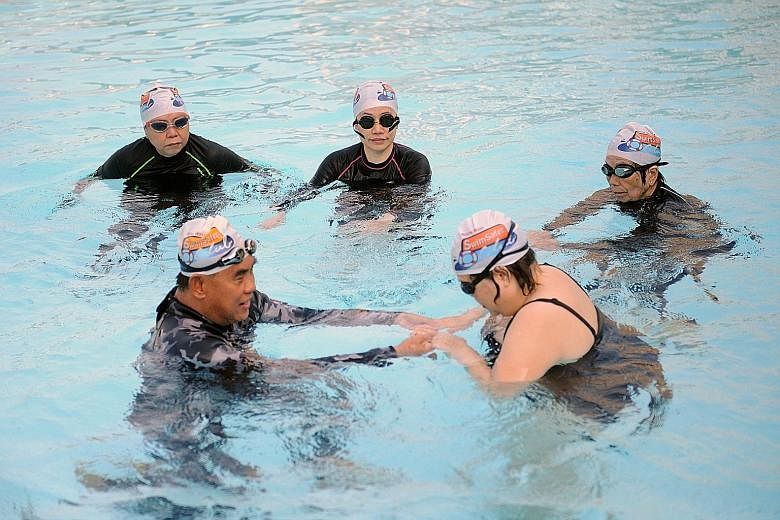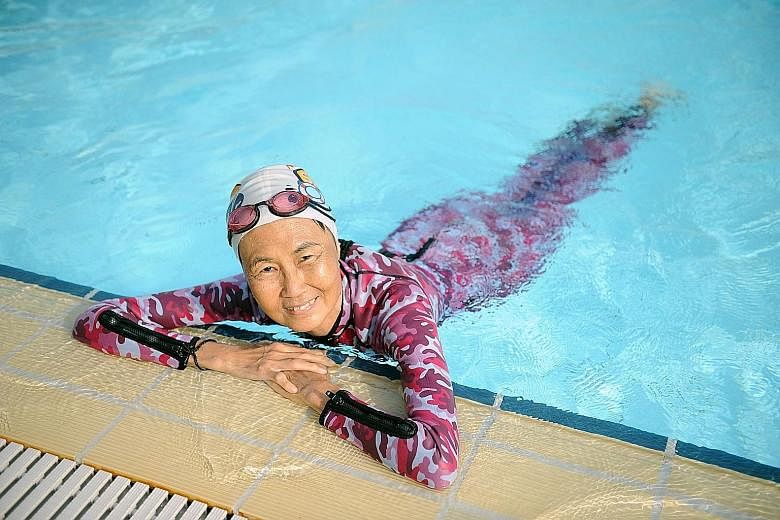Housewife Wee Peck Hoon had always liked the idea of a relaxing swim in the pool.
But it was only three years ago that she finally took the plunge, at the age of 60.
This was made possible by the setting up of swim clubs that cater to seniors who, like Madam Wee, are keen to learn basic swimming and water survival skills. They might not have had the chance to do so when they were younger, and swimming classes are often targeted at children.
To plug this gap, the first of the North West SwimSafer Clubs for Seniors was set up in Sembawang in 2014 with 13 members. It made a splash among seniors.
Today, it has expanded to eight clubs across Bukit Panjang, Yishun, Bukit Timah and Woodlands.
About 500 people have taken part in the clubs' swim programme, which is open to residents in the North West District aged 50 and above.
Participants go through the six-stage national SwimSafer Programme, which involves water safety skills, stroke techniques and coordinated breathing at different levels of difficulty.
Each person can get a one-time subsidy of $150 after completing 80 per cent of the classes. Fees for different instructors may vary.
The swim clubs are run by the North West Community Development Council (CDC) and are fully funded by corporate donations, which contribute to the subsidy each student gets.
Meanwhile, the SwimSafer Programme is managed by Sport Singapore and is partly sponsored by insurance company Manulife Singapore.
Swimming to better health and more friends
Currently, most seniors are at the first stage of the programme.
Those who wish to continue learning can advance to the higher stages.
The programme is not about transforming older folk into Olympic-level swimmers.
More importantly, the clubs provide an avenue for seniors to exercise regularly, said Dr Teo Ho Pin, mayor of the North West District.
"Not only that, they would also be able to forge new friendships and widen their social circle," said Dr Teo, who started the programme.
This was certainly the case for Madam Wee.
"I used to 'anyhow' swim," she said in Mandarin.
"My posture was wrong and I did not move well in the water."
These days, the 63-year-old swims laps effortlessly at Yishun Swimming Complex, all geared up in a pink full-body swimsuit, swim cap and goggles.
"After I learnt how to swim properly, going to the pool has become a daily habit," she said.
"I also made a few friends and we still keep in contact and meet up for tea."
Dr Teo added that picking up water skills can pave the way for seniors to try new activities.
"With basic swimming skills, the person can proceed to take part in other water activities, like water aerobics or other water sports," Dr Teo said.
GAIN CONFIDENCE IN WATER
A 2014 survey by North West CDC of 100 seniors showed that the opportunity to improve one's health was a top consideration for joining a swimming course.
Two out of three seniors, or 66 per cent, gave that as their top motivation to get in the pool.
However, more than half said they had "no confidence" and were "afraid to take the first step" to join a swimming class. Other reasons include not having friends to join the class with and discomfort over wearing swimsuits.
It is hoped that the swim clubs can remove these hurdles by providing a senior-centric environment.
A spokesman for North West CDC said: "The similarity in the demographics helps to create an atmosphere where the seniors can relax and be comfortable with each other." The team of instructors are also highly qualified and "senior-friendly", the spokesman added.
"They would often offer words of encouragement and guide them with patience, which helps to give seniors the motivation to learn."
One of the instructors, Mr Ivan Loh, 58, said the key lies in helping these older swimmers gain "water confidence".
This involves getting them to walk and float in water, hold their breath and blow air bubbles underwater.
"I will demonstrate the exercises, so they will not get scared," said Mr Loh, who has about 40 years of experience as a swim coach.
"As long as they can overcome their phobia of water, most of them are able to swim after four lessons, even if they are not so physically fit to begin with," he added.
By then, many would also be confident enough to hit the pool themselves.
Mr Carl Bradford, associate sport physiologist at the Singapore Sports Institute, said: "As we get older, it can become more difficult to learn new skills. However, that does not mean it is impossible."
Swimming can improve cardiovascular health and muscular strength, he said.
It has also been shown to be useful in preventing and managing diabetes and hypertension, he added.
"It takes four times more energy to swim than to run the same distance, and swimming typically results in less muscle soreness," Mr Bradford said.
The buoyancy reduces the impact and stress on joints, muscles and bones, he pointed out.
This makes the activity suitable for older people who have injuries or joint conditions like arthritis.
Just ask Ms May Chia.
Three years ago, the 58-year-old had to quit her job as a cleaner due to arthritis.
At that time, her joints were swollen and painful, and she also suffered from breathlessness.
All that changed about a year ago, when her friend encouraged her to take up swimming at the North West SwimSafer Club for Seniors.
"After I started swimming, my lungs became stronger.
"I can breathe normally now and my joints are no longer as swollen," she said.
Ms Chia added that she did not think of learning swimming previously as she was afraid of the cold.
There was also the fear that she would fare poorly and fail to learn the necessary techniques.
"But it was not as tough as I thought it would be.
"In fact, I was able to swim by my third lesson," she said.



